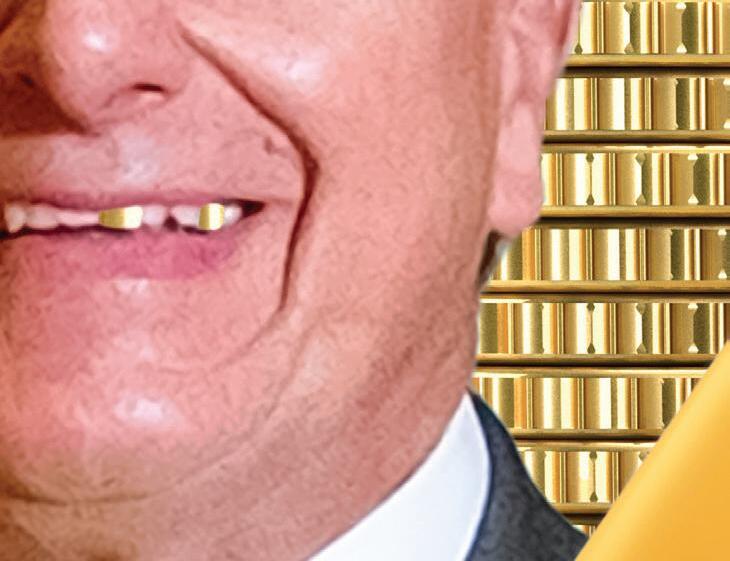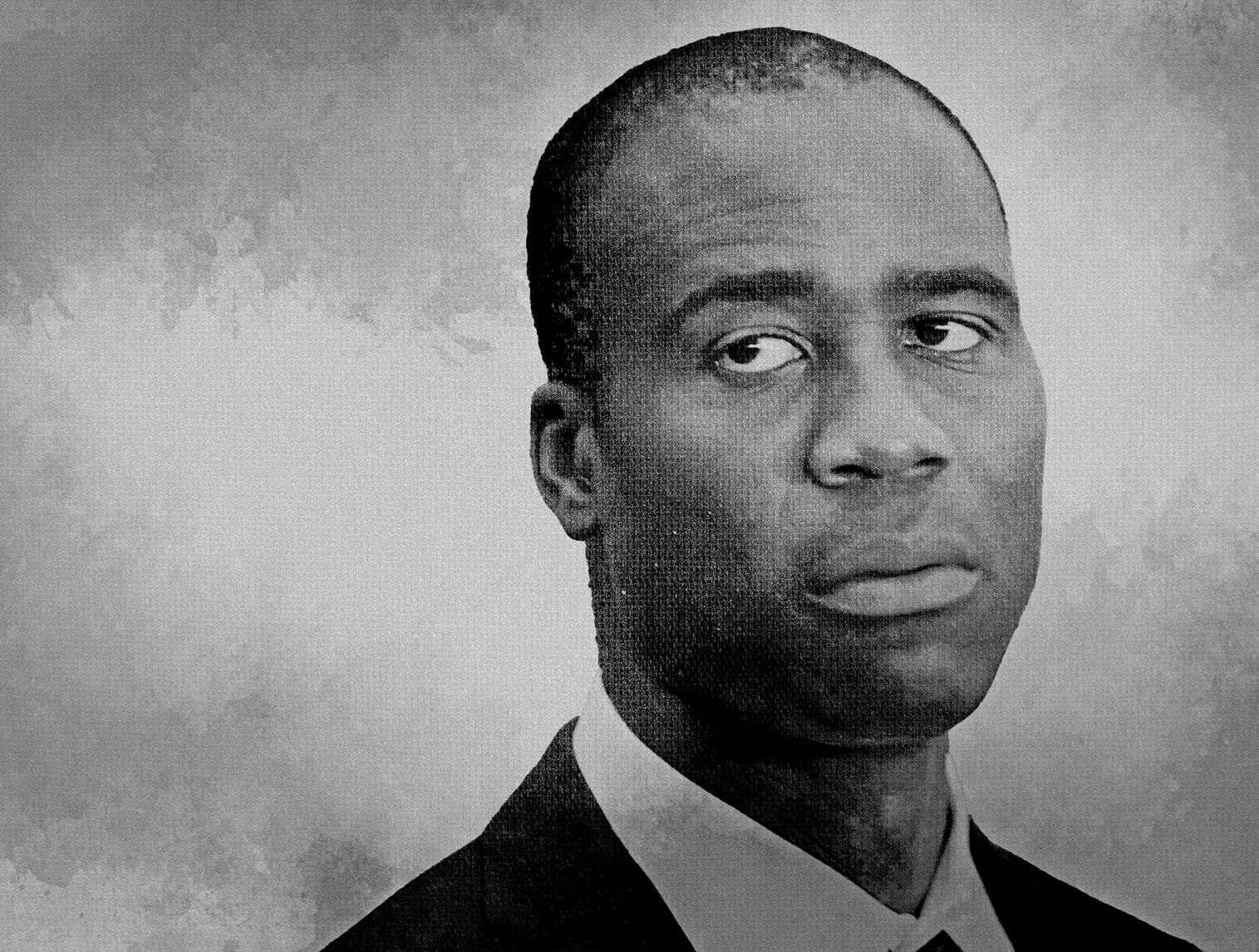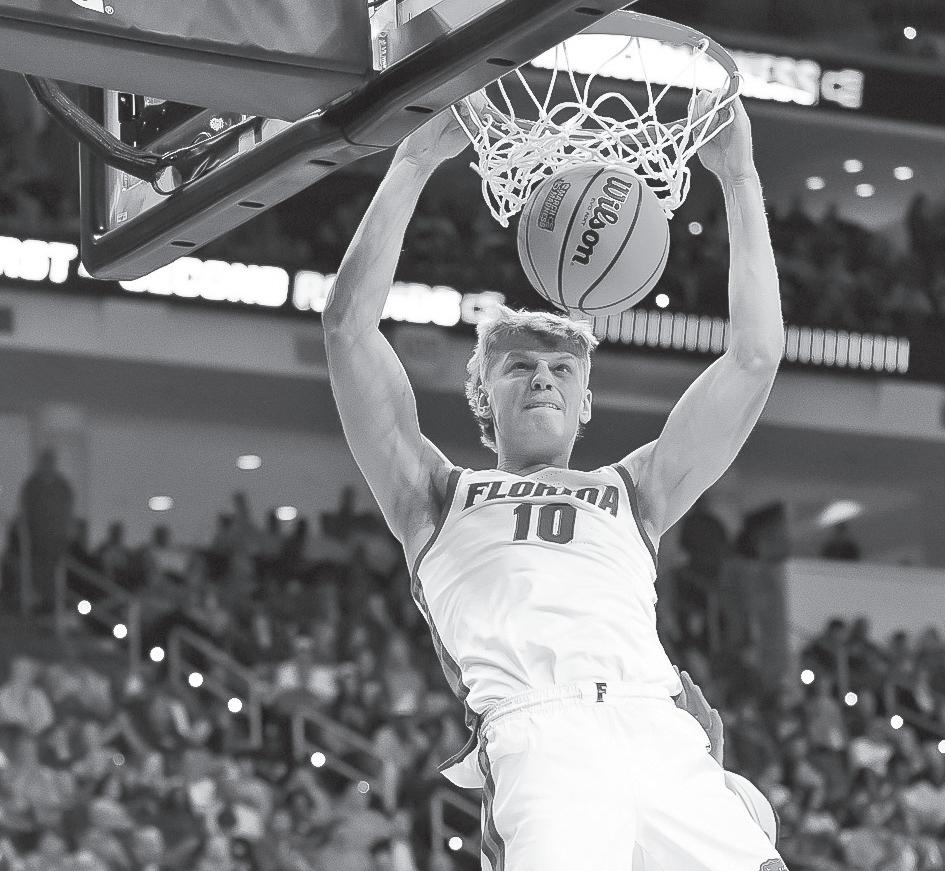
Noah
Lantor & Madilyn Gemme // Alligator Staff


Noah
Lantor & Madilyn Gemme // Alligator Staff
The Gators will take on Auburn with a National Championship berth on the line
By Noah White Sports Writer
SAN FRANCISCO — You could see the panic in Todd Golden’s eyes with three minutes left. Everyone in the Chase Center probably could, too. Surely, the University Avenue bars of Gainesville, congested with agitated fans, did as well.
A historic season, cementing the turnaround of a dormant college basketball power, was disappearing with every second, every shot. The hearts of Florida
fans everywhere slowly sank. That was until Walter Clayton Jr. rose.
With a Final Four berth on the line, trailing 77-75 despite a 9-2 run in the last two minutes, Florida’s senior AP All-American gathered himself. Underrecruited, underrated and now amid the biggest moment of his life, he had never been calmer. With one swift motion, turning his back to the basket, he whipped around, releasing a flawless shot. One
‘Ladapo’s a charlatan’:
By Garrett Shanley Alligator Staff Writer
When Gov. Ron DeSantis hand-picked Joseph Ladapo as Florida’s surgeon general in September 2021, the role came with a second high-profile appointment: a tenured faculty position at UF.
But Ladapo’s colleagues still aren’t sure what he does to earn his salary at the university. Some say not much.
UF fast-tracked Ladapo into a $337,000-ayear contract as part of his role as the state’s top medical official, tasking him with launching an internal medicine research program, taking on a part-time teaching role and leading
an administrative team.
A rising star among conservatives opposing pandemic-era safety measures, Ladapo dazzled UF’s top brass with his Ivy League credentials and multi-million dollar research portfolio. After reviewing his résumé, the medical school’s dean said he looked “fabulous.”
Now, more than three years into his tenure, internal records and interviews with more than a dozen professors and administrators raise questions about whether Ladapo is meeting UF’s expectations.
Ladapo’s work calendar shows monthslong stretches with little or no activity. Instead of attaining grants and conducting research, he spent his first year revising manuscripts and writing his memoir, “Transcend Fear,” which details his skepticism of vaccines.
He also promised to bring hundreds of thousands in research dollars from his previous job at the University of California at Los Angeles. That never happened. He blamed his

former boss, claiming she withheld the funds over disagreements about COVID-19 policies. A review of internal reports and public directories indicate Ladapo hasn't secured any research grants for UF.
His classroom contributions are similarly sparse. Ladapo agreed to dedicate 20% of his time to teaching; so far, that’s amounted to a handful of guest lectures. A proposed course on “critical evaluation of scientific evidence” has yet to materialize.
Meanwhile, he collects $75,000 a year leading what his contract described as an administrative team addressing healthcare disparities within UF’s hospital system. Yet records requests yielded little evidence of the team’s work.
Ladapo didn’t respond to an emailed list of questions about his time at UF. Spokespeople for the university and UF Health declined to answer specific questions about his tenure.
Ladapo’s dual appointment is a high-profile
instance of Florida Republicans installing party officials into lucrative posts at state universities with questionable results. State auditors recently dinged UF for continuing to pay Ben Sasse, a former Republican U.S. Senator, $1 million a year to co-teach an undergraduate course after resigning as the university’s president in July.
Although UF leaders initially welcomed Ladapo, issues with absenteeism, funding shortfalls and clashes with colleagues quickly emerged. Professors also questioned the speed at which the university awarded Ladapo tenure — academia’s most coveted status, offering effectively permanent job security to carefully vetted scholars. The process usually takes months or even years; a Faculty Senate report released months after his hiring found administrators approved Ladapo in less than three weeks.


By Annie Wang Alligator Staff Writer
As artificial intelligence continues to advance, infiltrating schools and workplaces, some students and professors have raised concerns about job displacement. However, others are more optimistic, believing the human element to be irreplaceable.
In 2023, the investment bank Goldman Sachs estimated 300 million jobs could be replaced by AI technology. The World Economic Forum’s 2025 Future of Jobs Report found roughly 41% of employers were considering workforce reductions due to advancements in AI.
Clerical positions and research assistant roles focused on data compilation are among the most vulnerable to being replaced by AI due to the ease of automation, said Vincent Bindschaedler, an assistant professor in the UF Department of Computer and Information Science and Engineering. This shift has the potential to push productivity forward, he said.
However, Bindschaedler said AI's limitations will require human oversight. For example, inaccuracies caused by hallucinations — the tendency for large language models to fabricate information when faced with uncertainty — require human intervention.
AI is also unlikely to replace jobs involving physical tasks, he said, as it hasn’t advanced to a level where it can effectively interact with the physical world.
Regarding jobs fueled by creativity, the question is whether humans value human creations, Bindschaedler said. While AI can produce high-quality images, videos and audio, some individuals will always prefer content created by humans over that generated by a machine, he said.
“It's possible that people will still seek out human-made art, even when it's at the point that AI-made art is ‘better,’” he said.
There are ethical concerns with how people perceive and utilize AI technology because of its disruption to society, Bindschaedler said. With jobs at stake, he said it’s important to consider whether AI integration will ultimately lead to greater happiness and success.
Although AI-driven changes won’t happen overnight, Bindschaedler said getting familiar with AI tools can boost productivity and may help safeguard jobs, at least in the short-term.
“It might show you what part of your job actually cannot be done by those tools, and then you understand what value you actually have, even in a world full of these AI agents,” he said.
Anand Rangarajan, a professor in the UF Department of Computer and Information Science and Engineering, encourages liberal arts majors to engage with chatbots and explore their limitations.
“You will be able to bring a level of creativity, and you’ll be challenged because it's going to keep pushing you,” he said. “You would improve by knowing where it fails.
That's important.”
While AI is able to handle basic data tasks and generate content such as videos and music, it lacks discernment and ingenuity, Rangarajan said. Human experience, awareness and perspective are presently irreplaceable, he said.
While Rangarajan acknowledged issues associated with AI, such as cheating, he said adjusting policies could transform AI from a crutch people overly rely on into a tool for spurring creativity.
“The question is, how do you change the policies so that a useful tool remains a useful tool, but isn't regulated out of existence?” he said.
Students weigh in Christian Niebauer, a 20-year-old UF computer engineering junior specializing in hardware design, said he isn’t too worried about the impact of AI on his field — at least not yet. Niebauer said AI hasn’t yet mastered hardware design, but he does have worries that as AI continues to improve in this field, it could eventually take over his job.
Niebauer noted he’s already observed measurable improvements in AI’s handling of hardware descriptive languages over the past few years. This level of advancement could realistically happen within the next five years, Niebauer said.
“My plan right now is to just take machine learning courses and then maybe transition into that field at a later point, because I don't think I can outperform a very advanced computer,” he said.
To stay competitive in a world where AI is becoming more capable, Niebauer said people will need to start working with it, as those who choose not to will likely be left behind. However, he said AI will always have a distinct advantage: its sole purpose is to enhance its programming skills, whereas humans have lives outside of work.
Niebauer’s greatest concern is how companies choose to use AI and whether it’s going to be a way for companies to pay workers less because of the potential for AI to be cheaper and more efficient.
“My ideal situation would be that there's some kind of restriction in place that's like, ‘You can't have an AI do that for you because people need jobs,” he said, “but I try to be optimistic that that type of legislation would be put in place.”
Tristan Krammel, a 21-year-old UF English junior, said he believes using AI for brainstorming is acceptable, but that’s where he draws the line.
Regardless of how good AI is at producing its intended results, he said he wants to develop his own understanding of style and grammar without depending on a computer. For him, relying too heavily on AI would undermine the purpose of studying English.
AI-generated content may eventually rival or even surpass human creations, Krammel said, with a shift already evident. A 2024 study published in Scientific Reports found nonexpert readers favored poems generated by ChatGPT-3.5 over those written by famous poets like William Shakespeare, Emily Dickinson, Walt Whitman or Sylvia Plath.
“We have to ask ourselves some

Have an event planned? Add it to the alligator’s online calendar: alligator.org/calendar
very important questions, like is the key point of art and literature just to be good, or is a key point to be human-created?” Krammel said. “Everyone calls it AI slop, but in five or 10 years from now, what if AI is just inherently better than human creations?”
Krammel stressed the importance of holding those in the tech industry accountable for their creations. While he acknowledged it would be unreasonable to expect individuals to turn down lucrative job opportunities in favor of morality, he said responsibility for the impact of their work is essential.
It’s also important to establish interest groups and advocate for stronger legislative restrictions on AI, Krammel said. Without sufficient pushback, he fears humanity could face unforeseen consequences.
“If we wait 15 years to start pushing back against AI, it will be too late, because all the corporate interest would have gobbled it up, and we would have no power as individuals,” he said.
Devon Stettler, a 23-year-old UF computer science graduate student, said he believes the concern about AI replacing jobs is overstated because the only skill it’s currently proficient at is writing basic code and creating templates. Beyond that, Stettler said AI is significantly lacking.
He doesn’t foresee AI replacing many computer scientists, he said, except for some entry-level coders who are fresh out of a boot camp with only basic web development skills.
“From a software engineering perspective, [basic coding] doesn't really matter as much because… your main output isn’t code,” he said. “Your main output is the thought behind the code.”
One of his biggest concerns with AI in regards to the job market is that it might make students less prepared when entering the workforce, he said. Students might use it as a crutch for projects and assignments, which he said is especially harmful for students establishing a baseline.
AI can act as a study assistant to help students understand certain concepts, Stettler said, but he cautioned against using it for projects. Since AI primarily generates summaries, he said it doesn’t provide the depth needed for true learning.
“Even though I am personally unimpressed with [AI], I think it is very valid that people are very concerned about it,” he said. “I think it's going to currently hit education the worst, and I think that is where a lot of importance should be placed, because I think it's going to screw over a lot of people in the near future.”
@wynwg awang@alligator.org

Not officially associated with the University of Florida Published by Campus Communications Inc., of Gainesville, Florida
NEWSROOM:
Editor-In-Chief
Engagement Managing Editor
Digital Managing Editor
Senior News Director
Metro Editor
University Editor
352-376-4458
Ella Thompson, ethompson@alligator.org
Nicole Beltrán, nbeltran@alligator.org
Kylie Williams, kwilliams@alligator.org
Megan Howard, mhoward@alligator.org
Bailey Diem, bdiem@alligator.org
Garrett Shanley, gshanley@alligator.org
Sophia Bailly, sbailly@alligator.org
Opinions Editor
Enterprise Editor El Caimán Editor
Kairi Lowery, klowery@alligator.org
Tanya Fedak, tfedak@alligator.org
Megan Howard, mhoward@alligator.org
Sports Editor
Assistant Sports Editors
Multimedia Editor
Assistant Multimedia Editor the Avenue Editor
Copy Desk Chief
Data Editor
Editorial Board
Advertising Office Manager
Jack Meyer, jmeyer@alligator.org
Noah White, nwhite@alligator.org
Hailey Hurst, hhurst@alligator.org
Madilyn Gemme, mgemme@alligator.org
Sydney Johnson, sjohnson@alligator.org
Noah White, nwhite@alligator.org
Zoey Thomas, zthomas@alligator.org
Ella Thompson, Nicole Beltrán, Kylie Williams, Kairi Lowery
352-376-4482
Sales Representatives Cheryl del Rosario, cdelrosario@alligator.org
Sales Interns
Paige Montero, Sirin Bektas, Michelle Gilman, Rebecca Jones, Caroline Murray, Madison Kahn
Nethumi Ratnayake, Sofia Korostyshesky, Rachel Al Baissari
352-373-3463
Classified Advertising Manager Ellen Light, elight@alligator.org
352-376-4446
Comptroller Delia Kradolfer, dkradolfer@alligator.org
Bookkeeper Cheryl del Rosario, cdelrosario@alligator.org
Administrative Assistant Ellen Light, elight@alligator.org
ADMINISTRATION
352-376-4446
General Manager Shaun O'Connor, soconnor@alligator.org
President Emeritus C.E. Barber, cebarber@alligator.org
IT System Engineer Kevin Hart
Production Manager
Namari Lock, nlock@alligator.org
Publication Manager Deion McLeod, dmcleod@alligator.org

Got something going on? Want to see it on this page? Send an email with “What’s Happening” in the subject line to engagement@alligator.org. To request publication in the next day’s newspaper, please submit entries before 5 p.m. Please model your submissions after the above events and keep them to 150 words or fewer. Improperly formatted “What’s Happening” submissions may not appear in the paper. Press releases will not appear in the paper.
The Independent Florida Alligator is a student newspaper serving the University of Florida, published by a nonprofit 501 (c)(3) educational organization, Campus Communications Inc., P.O. Box 14257, Gainesville, Florida, 32604-2257. The Alligator is published Monday mornings, except during holidays and exam periods. The Alligator is a member of the Newspaper Association of America, National Newspaper Association, Florida Press Association and Southern University Newspapers.
The Alligator offices are located at 2700 SW 13th St. © Copyright 2020. All rights reserved. No portion of The Alligator may be reproduced in any means without the written consent of an officer of Campus Communications Inc.
Subscription Rate: Full Year (All Semesters) $75
The Alligator strives to be accurate and clear in its news reports and editorials. If you find an error, please call our newsroom at 352-376-4458 or email editor@alligator.org

































































































LADAPO, from pg. 1
“This was definitely a pressure hire,” said one professor with intimate knowledge of the process. The professor, who was granted anonymity to freely discuss details that could reflect poorly on their employer and one of the state’s top public officials, described Ladapo’s position at UF as a “cushy job here to fill out the remainder of his paycheck.”
Faculty members also raised concerns that Ladapo’s contentious scientific beliefs would erode UF’s credibility as one of the nation’s top research institutions.
Like DeSantis, Ladapo gained national attention during the COVID-19 pandemic for defying mainstream medical guidance. As surgeon general, he’s opposed vaccine recommendations from the Centers for Disease Control — and UF — and, most recently, embarked on a statewide tour urging counties to remove fluoride from drinking water, despite evidence of its dental health benefits.
The medicine college’s faculty council voted in November to rebuke Ladapo for “promoting health misinformation and for breaching the trust placed in him as a faculty member,” urging the dean to “publicly and unequivocally denounce Dr. Ladapo’s misinformation campaigns.”
“Ladapo’s a charlatan,” said Jeffrey Goldhagen, a longtime UF pediatrics professor and administrator at the university’s medicine college in Jacksonville and former director of the Duval County Health Department. “It completely decimates the reputation of the University of Florida.”
The Alligator’s reporting on Ladapo’s rocky tenure comes as Tallahassee scrutinizes state university budgets for wasteful spending and unproductive staff. The GOP-dominated legislature has also pushed through a law requiring tenured faculty to undergo high-stakes posttenure review every five years — a measure DeSantis said was necessary to get rid of “unproductive” professors who were the “most significant deadweight cost” facing universities.
For Ladapo to meet the medicine college’s post-tenure review standards, he’ll need to secure at least $500,000 in outside research funding and 10 publications in peer-reviewed journals during the five-year review period.
Asked how the university would handle Ladapo’s case, UF Health spokesperson Melanie Ross said the institution will “adhere to all relevant university and state policies and requirements regarding evaluation of and posttenure review for all faculty members.” She declined to comment further, saying the university doesn’t discuss personnel matters with the press.
The DeSantis administration redirected The Alligator’s questions regarding Ladapo’s
tenured faculty position to the Florida Department of Health, which didn’t respond in time for publication.
A balancing act
Balancing scholarly duties with running the third largest state’s health department is a daunting job.
“It was grueling,” said Scott Rivkees, Ladapo’s predecessor in the surgeon general role and the former chair of UF’s pediatrics department. Rivkees said he worked 12-hour weekdays at the health department in Tallahassee during the pandemic and drove down to Gainesville on weekends to catch up on his research duties.
Florida law allows state agency heads to work a second job under two-year “interchange agreements,” allowing them to collect two salaries. Between his two roles, Ladapo’s combined annual pay is $437,000 — three times the governor’s salary.
As part of his surgeon general appointment in 2019, a new contract with UF made it so his state role would count as 80% of his duties, with research and teaching accounting for the remainder.
Ladapo’s agreements, however, don't indicate in writing how much time he’s supposed to spend on each role. His UF job letter assigns him a full-time, 12-month position, which he’s allowed to keep after his interchange agreement expires at the end of his surgeon general term.
When Democratic lawmakers at his confirmation hearing in early 2022 asked him how much time he was spending at UF, Ladapo said he couldn’t answer.
“But I can tell you almost every waking hour I have, I am either exercising, spending time with my family or working,” he said. “I don’t get a lot of sleep.”
By that point, Ladapo was already hitting roadblocks in his research.
Money problems
Around December, Ladapo began working with administrators to carry over his research projects and grant money from UCLA, promising to secure a subcontract from at least one of the National Institutes of Health grants he’d landed there.
Ladapo’s controversial stances on COVID-19 policies, however, strained his relationships with UCLA colleagues; he lamented in his memoir that “things had deteriorated into something resembling a bad marriage” before his departure. His division chief Carol Mangione once accused him of violating the Hippocratic Oath — a code of conduct physicians are required to take pledging good ethical practice — and spent large parts of the work day dealing with complaints about his writings.
Before arriving in Florida, Mangione said

Joseph Ladapo does at UF.
UCLA wouldn’t let him transfer any of the money to UF, according to emails obtained by The Alligator. She feared Ladapo’s new position in a Republican administration and views on public health would lead to partnered clinics dropping out of the study.
Early in the process of transferring one of Ladapo’s HIV studies to UF, the new project lead at UCLA told research administrators there weren’t plans to send over grant money.
Ladapo assured administrators in January the issue was “actually not resolved” and followed up with UCLA in May demanding an explanation. Mangione and the new project lead said they needed to dedicate all resources toward the study’s Los Angeles operations.
Ladapo didn’t think so. In a complaint to the NIH’s Office of Research Integrity, he alleged the decision was driven by Mangione’s political bias against his position as Florida’s surgeon general, citing his past interactions with her and claimed there was up to $300,000 in leftover funding.
“While this type of bias may not elicit the type of response from NIH as a bias based on an investigator’s race or sex, for example, it is still, in my opinion, improper,” he wrote.
According to emails, Ladapo also sought help from top university officials and his legal team at the Florida Department of Health. The university’s vice president of research David Norton relayed that UF’s top lawyer said UCLA had no obligation to transfer the grant money.
The research integrity complaint was Ladapo’s only recourse. He spent the next five months asking the NIH for updates on the case, expressing confusion about why it was taking so long to resolve. He said UCLA’s decision was harming his ability to conduct research because he wasn’t receiving any financial support for his efforts.
“I’m a bit nonplussed,” he told the research integrity office in a December 2022 email. “There seems to be little deference for the professional courtesy that typically obligates a timely response to inquiries, and little concern over the implications that a potential violation of research ethics has for a researcher’s career.”
An NIH official responded he couldn’t comment.
It remains unclear whether the NIH or UCLA ever investigated Ladapo’s claims. Mangione, reached through a UCLA spokesperson, declined to comment for this story. The NIH didn’t respond in time for publication.
Three months later in March 2023, Ladapo emailed an NIH officer asking for help transferring money from another one of his grants at UCLA. They denied him.
Read the rest online at alligator.org.
@garrettshanley
gshanley@alligator.org
By Grace McClung Alligator Staff Writer
UF’s next president stands to earn up to $3 million a year under a tentative compensation package approved by the UF Board of Trustees.
Newly released minutes of a Feb. 25 committee meeting show trustees are willing to offer their pick to lead the state’s flagship institution an annual pay as much as $1 million more
than what they offered former President Ben Sasse.
Mercer, a consulting firm hired to craft the compensation package, attributed the potential pay increase to high turnover rates and rising presidential salaries. Many universities pay their presidents millions annually, often well above what governors and other highranking public officials make.
UF has historically been ranked among the top 20 public universities with highest paid
presidents, according to The Chronicle of Higher Education. Sasse, who resigned as president in July, had a five-year contract totaling $10 million, which included a $1 million salary, annual performance bonuses up to $150,000 and a $1 million retainer. As part of his resignation agreement, he will continue earning just over $1 million annually as a professor until 2028.
Kent Fuchs, Sasse’s predecessor who returned as
interim president in August, had a $1.1 million base salary. Fuchs receives $1 million per year in his temporary role.
Other Florida universities rank similarly. Florida State University pays its current president $1.1 million annually, University of Central Florida’s president is receiving a boosted annual salary of $900,000 and the former president of the University of Miami received $1.6 million per year.
A $3 million compensation
package, Mercer said, will keep UF consistent with market trends.
During the meeting, the Board of Trustees also approved the board chair’s authority to negotiate the final employment contract with the selected presidential candidate. Rahul Patel, a UF trustee chairing the search committee, said in December that finalists could be discussed as early as April.
@gracenmclung gmcclung@alligator.org
By Sofia Meyers Alligator Staff Writer
Before her 7:25 a.m. class, Chalisa Budhai is sometimes so groggy she forgets to pack an important item that can disrupt her day at a moment’s notice: menstrual products.
In a pinch, the 21-year-old African American studies, legal history and political science junior heads to one of 18 campus restrooms with period packs — pink, stickercovered cardboard boxes filled with free tampons and pads.
UF’s chapter of Planned Parenthood Generation Action began distributing period packs in Spring 2024 as part of a broader effort to make menstrual products more accessible to college students. Now, the organization is working with the company Aunt Flow, current Student Government vice president Laura Thomas and Student Government vice president-elect Jade Gonzalez, to expand the project to more campus bathrooms.
The partnership will build upon an existing project spearheaded by Aunt Flow and Thomas, which installed 12 permanent period product dispensers in gender-neutral bathrooms across campus in Fall 2024. The group is still determining how many bathrooms it’ll expand the project to, Thomas said.
“[Menstrual products are] something that you shouldn’t have to pay for, go off campus for,” she said.

Jea Nace // Alligator Staff
UF Period Packs is helping to supply students with necessary products in first-floor bathrooms.
UFPPGA originally launched its period packs program to combat “period poverty,” defined by the National Institutes of Health as “having insufficient access to menstrual products, education, and sanitation facilities.”
Recent data from various online surveys and publications, including the National Center on Safe Supportive Learning Environments and intimate health brand INTIMINA, estimates between 10% and 20% of U.S. college students suffer from
period poverty.
A 2023 online survey by INTIMINA on 1,300 college students found over 18% of students felt forced to decide between buying menstrual products and meeting other personal costs, like paying bills or buying food, within the year. The survey primarily drew from Ohio State University, University of WisconsinMadison and Harvard University students.
Sisters Chloe and Sonja Wangensteen took over the period packs
initiative after its founder, UF alumna Sabrina Briceno, graduated last spring. They hope the group’s new partnership with Aunt Flow and Student Government will help make period packs a permanent fixture in campus bathrooms.
Each week, the period packs are refilled with new products.
“The ultimate goal is really just to expand this as far as we can and to get a more permanent solution, not a little cardboard box,” said
Chloe Wangensteen, a 22-year-old applied physiology and kinesiology senior.
She said she got involved with the initiative after experiencing difficulties finding accessible menstrual products when she first started studying at UF.
“I think at the time there was one bathroom that had a tampon dispenser in it, and it was empty,” Chloe Wangensteen said. “It was like 25 cents or something, and it didn’t even work.”
The project relies on student volunteers and donations to supply the period products. Restroom users are encouraged to leave spare menstruation products, and they can scan a QR code on the side of the packs to request refills. The organization also has an Amazon wishlist, where people can buy menstrual products for the packs.
Sonja Wangensteen, a 19-yearold applied physiology and kinesiology sophomore, said she hopes period packs can help everyone on campus feel safe and supported.
“Menstrual products are just something that should be available, almost like toilet paper,” she said.
Ainsley Marshall, a 21-year-old music history and literature senior, said the packs have been “a relief” when her periods begin unexpectedly on campus. Even when she doesn’t need one, the period packs make her feel supported and more comfortable.
“It’s just really nice to see that there’s that type of support among women,” Marshall said.
@SofiaMeyer84496 smeyers@alligator.org
By Pristine Thai Alligator Staff Writer
UF is eliminating thousands of dollars in funding and staff support for several identity-centered welcome assemblies, potentially jeopardizing events meant to acclimate new Gators to campus.
The cuts will affect the annual welcome assemblies of at least four student organizations: the Black Student Union, Pride Student Union, Hispanic-Latine Student Association and Women’s Student Association. The assemblies, funded by UF’s Signature Events program, hosted incoming students each August with performances, food, merchandise and opportunities to get involved on campus.
A university spokesperson didn’t respond to questions about the funding cuts, and the leaders of affected organizations said administrators didn’t explain the rationale for the decision. Some students fear it’s the latest example of how efforts to dismantle diversity initiatives impact campus life with uncertain benefits for students.
The Trump administration issued an order in February threatening to withhold federal funding from schools that considered race in all campus activities. Just days after, UF paused several on-campus housing programs geared toward certain identity groups.
Republican state lawmakers are separately planning to scour state universities’ budgets to ensure compliance with a 2023 law banning diversity, equity and inclusion initiatives. At a meeting with the state university system’s Board of Governors March 26, Gov. Ron DeSantis suggested some schools were enforcing the ban on “a superficial level” and allowed some diversity programs to “burrow in and rename.”
“There is some sense, in some quarters, that the law in the state of Florida is not obligatory on them, and they can kind of do their own little fiefdom,” DeSantis said. “That’s not going to fly here.”
The university funded the welcome assemblies through its Signature Event program, which recognizes events promoting “a vibrant and diverse student experience that prepares Gators to engage, transform, and thrive in an evolving global community.”
“Although we shouldn’t have been put in this situation, unfortunately, we are,” said Olivia Tulloch, the director of the Black Student Union’s welcome assembly. “Regardless of any legislation that is passed to suppress our voices or anything that we want to do on campus, if there’s a will, there is a way, and we have to make it ourselves.”
Tulloch, a 21-year-old psychology and criminology junior, said the university’s decision not to support the assembly this year comes amid rising financial needs for the event, stemming from its increasing popularity. A record-high of 570 students attended the Fall 2024 assembly, bringing the allotted event budget up to $15,000 — a $2,500 increase over
the previous year.
Tulloch defended the assembly as an entry point for Black students looking to feel more at home on campus, adding the organization is exploring new funding sources, including alumni donations. Dozens of alumni pledged to support the event in the comments of BSU’s social media announcement of the cuts.
“It’s a big reason that I stayed at this university,” Tulloch said of the event. “The connections I made, the experiences I had, that I only would have known about if I had gone to that assembly.”
It’s unclear how much money the university is pulling from welcome assemblies or how many will be affected.
The Hispanic-Latine Student Association announced its assembly lost Signature Event status in an Instagram post March 12. The statement cited “changes in state and federal DEI regulations” as the reason for UF’s decision, although the organization’s executive board didn’t respond to texts or emails clarifying if administrators explicitly told it this reason.
The Women’s Student Association also released a statement on Instagram March 25, saying the decision to stop funding assemblies “follows a troubling pattern” of budget cuts to “student-led cultural and identity-based initiatives.”
Women’s Student Association President Zeina Benton, a 21-year-old astrophysics and women’s studies junior, estimated the Fall 2024 Women’s Welcome Assembly received about $1,500 in funding from the university. Benton declined to answer further questions
about the cuts.
Members of the Asian American Student Union’s leadership team didn’t respond to texts or emails asking about the status of its welcome assembly.
UF did renew funding for the Graduate Student Council’s welcome assembly, according to an email from the council’s president, making it the only assembly confirmed to still be a Signature Event.
The Pride Student Assembly, which has received $10,000 from the university each year since 2022, won’t receive funding for at least three years, according to Jonathan Stephens, a 22-year-old food science senior and the president of Pride Student Union.
Stephens said the assembly attracts roughly 500 students each year and described it as a haven for “queer joy.” When new students meet other LGBTQ+ peers for the first time, they said it “really allows for folks to know that there is a family in Gainesville.”
Like the Black Student Union, PSU is pursuing alumni donations to replace university funding. Stephens said organizers are seeking help from supportive administrators, adding that while they think UF’s priority is legal compliance, many officials are sympathetic to PSU’s efforts.
“Where we’re at right now is trying to pick up the pieces,” they said. “At the end of the day, what’s really important is that we try our best to preserve those relationships and that we, too, try to find ways to comply with the law.”
@pristinethai pthai@alligator.org
MONDAY, MARCH 31, 2025
www.alligator.org/section/the_avenue
JENNIFER KNAPP USES MUSIC TO REDEFINE FAITH AND IDENTITY THROUGH MESSAGES OF SELF GROWTH
By Autumn Johnstone Avenue Staff Writer
When Christian singer-songwriter Jennifer Knapp came out as gay in 2010, she was confronted by a pastor on national television for her “sin.” The terrifying prospect of coming out in a faith-based environment made it seem nearly impossible for her to carry on with her music career. Yet, after realizing real faith knows no boundaries, she let go of the mold she so desperately once tried to fit into.
At The Bull, a Gainesville bar and music venue, on March 27, Knapp performed a short set list with a lasting impact. With the feeling of a listening room, Knapp connected to fans who have been listening to her music for over 20 years and strangers who never knew her name until that night.
At the start of her career, Knapp wrote music about her upbringing. She was surrounded by people who repeatedly told her who she should be, rather than her finding that out for herself. She processed her own development under the influence of her church community and, because of that, she
didn’t know who she really wanted to be in light of those ideas, she said.
This “soul-searching” train of thought is what ultimately drove now 50-year-old Knapp to pick up the guitar in the first place. In those early days, she thought of music as a way of healing herself, but later, she found it’s an invitation for others to experience growth as well.
“I really care about the human heart and spirit and who we’re all genuinely trying to become,” she said. “There’s nothing, to me, more rewarding than being a part of that conversation and being able to be empathetic.”
Knapp’s 2008 album, “Kansas,” was produced with this growth mindset as inspiration and named for her birth state. It encouraged people to grow up to be the people they wanted to be, she said. Typically, most pieces of Christian music attempt to paint a picture of what a “good Christian” might look like. But Knapp saw it’s not a “one-size-fits-all kind of garment” people can put on to be faithful. It’s the spirit of being generous and offering opportunity to someone else’s life, she said.
“Kansas” also gave all kinds of people permission to personally evolve through a journey many of them longed to begin, Knapp said, but hadn’t had the courage to until now.
“The end isn’t about churning out an end-product,” she said. “It’s about the development of the person inside of that [and] using that pool of wisdom to figure out who
we are.”
Knapp found this mentality is also reflected among the queer community. As the gender and sexuality spectrum of the LGBTQ+ community evolves, more people have noticed how the typical model of what it means to be queer isn’t a script for how one is supposed to look or act, she said. This crossover of concepts between the queer community and faith community has helped her and her friends understand their own personal spiritual experiences.
To further her spiritual growth and protect her queerness, Knapp established the Inside Out Faith Foundation 13 years ago. Advocating for LGBTQ+ inclusion in faith communities, the foundation allowed her to connect with churches for meaningful performances that altered how people saw faith and queer communities.
As a woman who grew up in a male-dominated church environment, she encountered sexist ideas that damaged the dignity of all genders. The struggles many women experience intersects with queer challenges, Knapp said.
“They’re all linked to the same obligation we have: to figure out who we are as people of dignity,” she said.
While many may think Christianity and queerness are at opposite ends of a socio-political lens, 21-year-old UF health science junior Sophia Scribani said she believes humans
are multifaceted. There’s not just one umbrella all queer people fall under, and there’s not only one way to be queer, she said.
Outside of religion, being female and queer can be difficult without proper representation like Knapp’s story. Scribani said she admires Tracy Chapman’s music because Chapman released it while she was a closeted lesbian.
“It’s very hard in the music industry to be anything other than heteronormative,” she said. “You listen to that music now, and you can feel the queer joy in it. It’s really empowering.”
Capturing the feminine experience can be complex, but for Addison Weaver, a 19-yearold UF biochemistry freshman, she looks to musicians like Fiona Apple and PJ Harvey for art that speaks to her personally. Music is a way for female artists to express the frustrations they struggle with in respect to their identities, she said.
For women and queer people, Weaver said she hopes more people will come to acknowledge women’s impactful roles in everyday life.
“The discourse around them has shifted farther away from all those shallow topics to more of what women can contribute to music as an art,” she said.
@AutumnJ922 ajohnstone@alligator.org
THE 1960S RENDITION OF “THE TAMING OF THE SHREW” CHALLENGES THE MESSAGES OF THE ORIGINAL TEXT
By Juliana DeFilippo Avenue Staff Writer
After nine performances, the cast of Acrosstown Repertory Theatre’s production of “The Taming of the Shrew” realized men and women see their play differently. As Petruchio, the play’s domineering leading man, pats his wife Katherine on the head and remarks “good girl,” female audience members audibly cringe, while male audience members often laugh.
Director Andrea Young knew it would be a challenge to highlight both the humor of the play and its disturbing implications. She decided to use an all-female cast, staging the play as a 1960s sitcom inspired by “I Love Lucy.” She felt the audience would be more comfortable with an all-female interpretation of overtly masculine characters, allowing them to explore the sexism of the time without losing Shakespeare’s wit.
“I had a friend that said ‘The more I think about the show, the more I’m uncomfortable and don’t like it,’” Young said. “And, yes, that’s the point.”
Shakespeare’s “The Taming of the Shrew” has garnered controversy over its 400-year existence due to its sexist themes and depiction of domestic abuse. It follows several characters on a mission to marry the beautiful Bianca Minola, whose older sister Katherine is labeled as a “shrew” for her independence and rebelliousness. Petruchio marries Katherine and proceeds to abuse her into submission.

Keep up with the Avenue on Twitter.
Tweet us
@TheFloridaAve.
Young considers her take on the play as more of an edit than an adaptation. She kept all of the original dialogue, making only a few changes for clarity. It’s in her inclusion of subtle, dark details that her directorial vision shines through. Her characterization of Petruchio varies between a cartoonish, ultra-macho man and a sinister villain.
“Not only is he a villain, he’s a very likable villain,” she said. “He’s charming and funny and smart, and he’s a bad guy.”
When Lola Bond got the role of Petruchio, she was shocked when reading through the script. She expected to play a character similar to Heath Ledger in “10 Things I Hate About You,” which is based on the play. Instead, she was met with an abusive manipulator.
“I realized I am playing who I hate,” she said. “I’d venture the vast majority of the women I know have been, at the very least, belittled by this man or made to feel purposely uncomfortable by this man.”
When playing the character, Bond highlighted Petruchio’s bravado and interrupted it with flashes of his sinister intentions. When Petruchio and Katherine first meet, their initially charming, witty banter quickly becomes unsettling as Petruchio physically tries to take control of Katherine.
When Petruchio is not boasting loudly to other characters, high-fiving and fraternizing with them, he addresses the crowd or Katherine in moments of chilling sincerity. The audience, usually laughing with Petruchio, sat in silence as Bond turned to the crowd to demand, “He that knows better how to tame a shrew, now let him speak.”
“People tell me, ‘You freaked me out,’” Bond said. “‘You were so gross. You were terrifying. You made me feel uncomfortable.’ And every time, I’m like, ‘Good. I did my job.’”
Caimán
El futuro de financiamiento y apoyo hacia asambleas universitarias. Leer más en la página 8.
Bond and Kate Clement, who plays Katherine, agreed it was the trust they have in one another that allows them to portray the destructive dynamic between their characters. Clement is quick to defend her character and said today she would be easily hailed as an independent, forward-thinking woman who “doesn’t take crap from anybody.”
The audience met Katherine in a blouse and pants as she smoked a cigarette disdainfully. She concluded the play in her wedding dress, her will deteriorated at the hands of her husband after he starved and exhausted her. Clement enjoyed Young’s decision to never have the lead characters reconcile, as many interpretations of the play do.
“There were just some moments where I was just like, ‘When do they start liking each other?’” Clement said. “But we got a pleasant surprise that she doesn’t like him.”
Clement remembered bringing her husband to see the play. She knew he understood the men in the play were meant to be laughed at, serving as hypermasculine caricatures of men that women might encounter in their daily lives. But ultimately, he can never fully grasp what Katherine is going through, she said. Just as Bond said, every woman has known a Petruchio; Clement felt every woman has been a Katherine.
“There are women in this room every single night that have felt what Kate has felt,” she said.
“The Taming of the Shrew” continues through April 6, with shows on Friday, Saturday and Sunday. Tickets are $25 and available through ART’s website.
@JulianaDeF58101 jdefillipo@alligator.org

www.alligator.org/section/opinions
There is something so tantalizing about listening to sad music — not so much for the catharsis Mitski offers or the emotional wreck that Julie Doiron pulls out of you in the most invasive ways imaginable, but for the aesthetic itself.
Doom scrolling on TikTok during the “Twilight” resurgence, we’ve all found ourselves lost in the sea of edits of Bella Swan staring melancholically out her window as the most gut wrenching strains of a Lykke Li song plays in the background. While I was team Jacob, I could only feel the pulling of my heart strings longing for Edward’s return.
Depression sucks. It’s not just the dark cloud over your head that perpetually drops 4-inch hailstones while you’re trying to study for your chemistry exam. It’s also attempting to stay functional while you see the people around you go through life with a certain kind of je ne sais quoi. The painful awareness of the cheat codes given out at birth, while you were left with playing life on hard mode.
The thing about clinical depression is that it’s spontaneous — it ebbs and flows in and out of your life. One day you can wake up feeling like you’re cured. Like the change you’ve been hoping for has finally manifested itself into your reality. You can finally become the person you’ve always dreamed of being.
Yet somewhere along the line, you feel the weight in your chest slowly spread throughout your body. Slowly but surely, getting out of bed feels like pulling teeth. The person in the mirror becomes unrecognizable, a mix of disgust and pity. You take a look around and feel like even your closest friends despise you. There’s this anger and resentment that fills you as you try to figure out where it all began. Your sensitivity heightens, and the slightest mishap or awkward situation feels like raw nerves exposed to the harsh wind. Each blow starts to feel like life is out to get you, leaving you with no choice but to lock yourself
in a tower and throw away the key.

Eriel Pichardo opinions@alligator.org
Eventually, like the Bella Swan edits, you begin to romanticize your mental health. Maybe not in the very sense of the word, but it starts to slowly become something you accept as your reality, something that is inherently who you are.
With every failure and sense of wasted potential that ruminates in your head, you can’t help but blame failed relationships, exams or random indiscretions on your depression. The smiles and words of encouragement from your therapist hide behind a paywall, and you can’t help but scoff at their optimism and roll your eyes at their advice.
But what you don’t realize is that by allowing your depression to become an excuse for hurting other people, including yourself, it becomes a weapon you yield to absolve yourself of any kind of accountability instead of fostering actual self awareness.
People grappling with their mental health can get caught up in their day to day. They fail to realize that not taking accountability for their issues indirectly ensures the people closest to them will receive the brunt of it.
I believe that it’s a symptom of our Western individualistic society, where we’re conditioned to adopt an external point of control. Where instead of believing that you have some semblance of control in your life, it seems as though things are happening to you rather than something we actively shape.
Read the rest online at alligator.org/ section/opinions.
Eriel Pichardo is a UF English senior.
About 170 years after the beginning of the women’s movement in 1848, gender equity has gradually gained momentum, with each generation inspiring women to assert their rightful place as equal to men. Generations see women’s roles through the lens of their times. Still, the push for progress continues, even as the paths forward evolve.
First, it’s important to highlight the differences between equity and equality, because they are not the same. By setting them apart, their definitions reveal how we shape different approaches to fairness and help us uncover the nuances of creating balanced opportunities for everyone.
As defined by Merriam-Webster, equity is fairness or justice in the way people are treated. Equality is the quality of being of the same measure as another.
Twenty-year-old UF applied physiology and kinesiology sophomore Amanda Porter defines gender equity as “treating both men and women fairly and equally, recognizing that some may need different needs and addressing different circumstances that may arise.”
She said her upbringing in Miami largely shaped her views on gender, teaching her that women were often expected to know how to cook and failing to meet these societal expectations could result in being seen as less than.
Even so, she said her mom always uplifted her, teaching her lessons about how a man’s remarks about women often reveal his insecurities about his masculinity. This perspective was shaped by growing up in an era of rapid social change and digital connectivity, reflecting the shifting attitudes of a younger generation, Generation Z.
The views expressed here are not necessarily those of The Alligator.
Despite her progressive mindset, she said she is concerned about the lack of female representation in leadership positions, highlighting that true equality remains an uphill battle in many spaces.

“I believe a major problem is the lack of female representation in leadership in which it limits their ability to influence decisions,” she said.
Her perspective highlights the barriers women face in achieving leadership roles and the impact this has on driving progress. However, perspectives from people in the Baby Boomer generation, like Mary Campbell, a 71-year-old retired teacher and reading specialist, offer contrasting views on where equity stands today.
She said progress has been made in how generations of women understand gender equity.
“I think there is a difference now, and I think we’re doing a really good job of telling our daughters ‘Yes you can, you are prepared and able,’” she said.
When describing her career path, she said being a teacher was her third or fourth option. She always wanted to be a chef, not an educator, but she was described as too small and too young.
Read the rest online at alligator.org/ section/opinions.
Isis Snow is a UF journalism and sports media junior.
The Alligator encourages comments from readers. Letters to the editor should not exceed 600 words (about one letter-sized page). They must be typed, double-spaced and must include the author’s name, classification and phone number. Names will be withheld if the writer shows just cause. We reserve the right to edit for length, grammar, style and libel. Send letters to opinions@alligator.org, bring them to 2700 SW 13th St., or send them to P.O. Box 14257, Gainesville, FL 32604-2257. Columns of about 450 words about original topics and editorial cartoons are also welcome. Questions? Call 352-376-4458.












LUNES, 31 DE MARZO DE 2025
www.alligator.org/section/elcaiman
SE PROPONE REDUCIR LA RAREZA DE PRODUCTOS MENSTRUALES EN EL CAMPUS
Por Sofia Meyers
Escritora de El Caimán
Traducido por Avery Parker
Escritor de El Caimán
Antes de su clase a las 7:25 de la mañana, Chalisa Budhai a veces está tan cansada que se olvida de empacar una cosa importante que puede interrumpir su día en cualquier momento: productos menstruales.
La estudiante de 21 años de tercer año de estudios afroamericanos, historia legal y ciencia política se va a uno de los 18 baños de campus que lleva paquetes menstruales — cajas rosadas y cubiertas de pegatinas que contienen tampones y toallas gratis. Action de UF comenzó a distribuir paquetes de período en la primavera de 2024 como parte de un esfuerzo más amplio para
hacer que los productos menstruales sean más accesibles para los estudiantes universitarios. Ahora, la organización está trabajando con la compañía Aunt Flow, la actual vicepresidenta del Gobierno Estudiantil, Laura Thomas, y la vicepresidenta electa del Gobierno Estudiantil, Jade González, para expandir el proyecto a más baños en la universidad.
La colaboración llega después de un proyecto existente encabezado por Aunt Flow y Thomas, que estableció 12 dispensadores permanentes de productos menstruales en baños neutros de género por todo el campus en el otoño de 2024. El grupo aún está determinado en cuántos baños va a instalar este proyecto, dijo Thomas.
“[Productos menstruales son] algo que no debes ser obligado pagar, salir del campus para encontrar”, dijo.
UFPPGA originalmente inició su programa de paquetes de periodo para luchar contra “pobreza de periodo”, definido como “acceso insuficiente para productos menstruales, educación y facilidades sanitarias”, por los Institutos
Nacionales de Salud.
Datos recientes de varias encuestas y publicaciones en línea, incluyendo el Centro Nacional de Entornos de Aprendizaje Seguros y Apoyantes y la marca de salud íntima INTIMINA, estiman que entre el 10% y el 20% de los estudiantes universitarios estadounidenses sufren de pobreza de periodo.
Una encuesta en línea realizada en 2023 por INTIMINA a 1.300 estudiantes universitarios encontró que más del 18% de los estudiantes se sentían obligados a decidir entre comprar productos menstruales y cubrir otros costos personales, como pagar facturas o comprar alimentos, dentro del año. La encuesta se basó principalmente en estudiantes de la Universidad Estatal de Ohio, la Universidad de Wisconsin-Madison y la Universidad de Harvard.
Las hermanas Chloe y Sonja Wangensteen se hicieron cargo de la iniciativa de los paquetes de período después de que su fundadora, la alumna de UF Sabrina Briceno, se graduó la primavera pasada.
Esperan que la asociación entre el grupo y Aunt Flow y el Gobierno Estudiantil ayudará a establecer
permanentemente los paquetes de periodo en los baños del campus. Cada semana, los paquetes de periodo están cargados de nuevo con productos nuevos.
“La meta última es sólo expandir este más que posible y conseguir una solución permanente, no una cajita de cartón”, dijo Chloe Wangensteen, una estudiante de último año de 22 años de fisiología y kinesiología aplicadas.
Dijo que se involucró con la iniciativa después de experimentar dificultades para encontrar productos menstruales accesibles cuando comenzó a estudiar en la UF.
"Creo que en ese momento había un baño que tenía un dispensador de tampones, y estaba vacío", dijo Chloe Wangensteen. "Costó como 25 centavos o algo así, y ni siquiera funcionó".
El proyecto se basa en estudiantes voluntarios y donaciones para suministrar los productos del período. Se anima a los usuarios de baños a dejar los productos de repuesto para la menstruación, y pueden escanear un código QR en el lado de los paquetes para solicitar recargas. La organización
también tiene una lista de deseos de Amazon, donde la gente puede comprar productos menstruales para los packs.
Sonja Wangensteen, una estudiante de segundo año de 19 años de fisiología y kinesiología aplicadas, dijo que espera que los packs del periodo puedan ayudar a todas en el campus para sentirse seguros y soportados.
"Los productos menstruales son algo que debería estar disponible, casi como el papel higiénico", dijo.
Ainsley Marshall, una estudiante de 21 años de último año de historia de música y literatura, dijo que los paquetes han sido “un alivio” cuando empiezan inesperadamente sus periodos en el campus. Incluso cuando no lo necesita, los packs de periodo le dan el sentimiento de estar soportada y cómoda.
“Es muy bonito ver que hay ese tipo de apoyo entre las mujeres”, dijo Marshall.
@sofiameyer84496 smeyers@alligator.org
@averyparke98398 aparker@alligator.org
EL CAMBIO LLEGA SEMANAS DESPUÉS DE LA OFENSIVA
CONTRA LA DEI POR PARTE DE LA ADMINISTRACIÓN TRUMP
Por Pristine Thai
Escritora de El Caimán
Traducido por Gabriella Chavez
Escritora de El Caimán
La UF está eliminando miles de dólares en financiamiento y apoyo al personal para varias asambleas de bienvenida centradas en la identidad, lo que podría poner en peligro los eventos hechos para asimilar a los nuevos Gators al campus. Los recortes afectarán las asambleas anuales de bienvenida de al menos cuatro organizaciones estudiantiles: la Unión estudiantil Afroamericana, la Unión estudiantil de Orgullo, la Unión estudiantil Hispana-Latina y la Unión estudiantil de Mujeres. Las asambleas, financiadas por el programa Signature Events de la UF, acogían a los estudiantes de primer ingreso cada agosto con presentaciones, comida, mercancía y oportunidades para involucrarse en la vida universitaria. Un portavoz de la universidad no respondió a preguntas sobre los recortes de financiamiento, y los líderes de las organizaciones afectadas dijeron que los administradores no explicaron la razón por la decisión. Algunos estudiantes temen que sea el último ejemplo de cómo los esfuerzos para desmantelar las iniciativas de diversidad impactan la vida en el campus, con beneficios inciertos para los

estudiantes.
La administración Trump emitió una orden en febrero amenazando con retener fondos federales de las universidades que consideren la raza en todas las actividades del campus. Pocos días después, la UF suspendió varios programas de vivienda en el campus dirigidos a ciertos grupos de identidad.
Los legisladores republicanos del estado, por su parte, están planeando inspeccionar los presupuestos de las universidades estatales para asegurar el cumplimiento de una ley de 2023 que prohíbe las iniciativas de diversidad, equidad e inclusión (DEI). En una reunión con la Junta de Gobernadores del sistema universitario estatal el 26 de marzo, el gobernador Ron DeSantis aludió a que algunas universidades estaban aplicando la prohibición "a un nivel superficial" y permitían que algunos programas de diversidad "se infiltraran y cambiaran su nombre".
"Hay cierta sensación, en algunos círculos, de que la ley en el estado de Florida no es obligatoria para ellos y que pueden hacer lo que quieran en su pequeño feudo", dijo DeSantis. "Eso no va a funcionar aquí".
La universidad financiaba las asambleas de bienvenida a través de su programa Signature Event, que reconoce los eventos que promueven “una experiencia estudiantil vibrante y diversa que prepara a los Gators para comprometerse, transformarse y prosperar en una comunidad global en evolución”.
“Aunque no deberíamos haber estado en esta situación, lamentablemente, lo estamos”, dijo Olivia Tulloch, directora de la asamblea de bienvenida de la Unión estudiantil Afroamericana. “Independientemente de cualquier legis-
Mantente al día con El Caimán en Twitter. Envíanos un tweet @ElCaimanGNV.
lación que se apruebe para suprimir nuestras voces o cualquier cosa que queramos hacer en el campus, si hay voluntad, hay manera, y tenemos que hacerlo nosotros mismos”.
Tulloch, una estudiante de psicología y criminología de 21 años, dijo que la decisión de la universidad de no apoyar la asamblea este año llega en medio de la necesidad financiera para el evento, debido a su popularidad que solo va incrementando. Un récord de 570 estudiantes asistieron a la asamblea de otoño del 2024, lo que aumentó el presupuesto asignado al evento a $15,000, un aumento de $2,500 con respecto al año anterior.
Tulloch defendió la asamblea como una vía para que los estudiantes afroamericanos se sientan más en casa en el campus, y agregó que la organización está buscando nuevas fuentes de financiamiento, incluidas donaciones de exalumnos. Docenas de exalumnos se comprometieron a apoyar el evento en los comentarios de la publicación en redes sociales de la BSU sobre los recortes.
“Es una de las principales razones por las que me quedé en esta universidad”, dijo Tulloch sobre el evento. “Las conexiones que hice, las experiencias que tuve, son experiencias que sólo habría conocido por ir a esa asamblea”.
No está claro cuánto dinero está recortando la universidad de las asambleas de bienvenida ni cuántas se verán afectadas.
La Unión estudiantil Hispana-Latina anunció que su asamblea perdió el estatus de Signature Event en una publicación de Instagram el 12 de marzo. La declaración citaba “cambios en las regulaciones DEI estatales y federales” como la razón de la decisión de la UF, aunque la junta ejecutiva de la organización
no respondió a mensajes de texto ni correos electrónicos aclarando si los administradores les explicaron explícitamente esta razón. La Unión estudiantil de Mujeres también publicó una declaración en Instagram el 25 de marzo, diciendo que la decisión de dejar de financiar las asambleas "sigue un patrón preocupante" de recortes presupuestarios a “iniciativas estudiantiles de base cultural y centradas en la identidad”.
La presidenta de la Unión estudiantil de Mujeres, Zeina Benton, una estudiante de 21 años de astrofísica y estudios de la mujer, estimó que la asamblea de bienvenida de la Mujer en el otoño del 2024 recibió alrededor de $1,500 en financiamiento de la universidad. Benton se negó a responder a más preguntas sobre los recortes.
Los miembros del equipo de liderazgo de la Unión estudiantil Asiática Americana no respondieron a mensajes de texto ni correos electrónicos sobre el estado de su asamblea de bienvenida.
La UF renovó el financiamiento para la asamblea de bienvenida del Consejo Estudiantil de Posgrado, según un correo electrónico del presidente del consejo, lo que la convierte en la única asamblea confirmada que todavía será un Signature Event.
Lea el resto en línea en alligator.org/section/elcaiman. @pristinethai pthai@alligator.org @gabriellach19 gchavez@alligator.org
Síganos para actualizaciones Para obtener actualizaciones de El Caimán, síganos en línea en www.alligator.org/section/elcaiman.
APARTMENT FOR RENT - FURNISHED 1BR / 1 Office, heat/air not central. 10 minutes from campus. 409 SE 14th Pl. Asking $900. Grad students pref. No drinking. No Drugs. No Pets. 55 & older. 352-213-5942 4-1425-3-1
NEW CONDOS-WALK TO UF For Info on ALL Condos for Sale, Visit www.UFCONDOS.COM or Matt Price, University Realty, 352-281-3551 4-21-25-14-5
● UF Surplus On-Line Auctions ● are underway...bikes, computers, furniture, vehicles & more. All individuals interested in bidding go to: SURPLUS.UFL.EDU 392-0370 4-21-25-14-10
● ● ● CLASSIC JEEP ● ● ●
1982 CJ8,Florida Gator colors,Frame up restoration , 1974 AMC 360 V8, Chrysler 900 3sp auto, Dana 300twin stick, new tub, Rubicon 4” lift w/ ranchero shocks, DCS ground lights, KC Daylights spots, Warn 9500lbs winch, dual yellow top battery system, Hornblaster train horns w/3lbs air tank, Herculiner floor coating, 33x 15 Super Swampers. $50,000. 561-248-9736 4-7-25-2-12
CASH PAID FOR HIGH-END MEN'S SPORT WATCHES. Rolex, Breitling, Omega, Patek Philippe, Heuer, Daytona, GMT, Submariner and Speedmaster. These brands only! Call for a quote: 1-888-280-1115 3-31-13-13
We Buy Vintage Guitar's! Looking for 19201980 Gibson, Martin, Fender, Gretsch, Epiphone, Guild, Mosrite, Rickenbacker, Prairie State, D'Angelico, Stromberg. And Gibson Mandolins / Banjos. These brands only! Call for a quote: 1-866-307-5421 3-31-13-13
● ● CASH FOR YOUR STUFF ● ● GAINESVILLE COLLECTIBLES IS BUYING Gold/Silver Coins ● Paper Money ● Stamps Watches ● Jewelry ● Silver Flatware Comic Books


WATER DAMAGE CLEANUP & RESTORATION: A small amount of water can lead to major damage and mold growth in your home. Our trusted professionals do complete repairs to protect your family and your home's value! Call 24/7: 1-866-7824060. Have zip code of service location ready when you call 3-31-59-15
PROTECT YOUR HOME from pests safely and affordably. Roaches, Bed Bugs, Rodent, Termite, Spiders and other pests. Locally owned and affordable. Call for a quote or inspection today 1-877-644-9799. Have zip code of property ready when calling 3-31-59-15
AGING ROOF? NEW HOMEOWNER? STORM DAMAGE? You need a local expert provider that proudly stands behind their work. Fast, free estimate. Financing available. Call 1-888-967-1158 Have zip code of property ready when calling! 3-31-11-15
● Affordable RV Camping Near Campus! ● Convenient location just minutes from UF. Safe, quiet, perfect for game day weekends. Water, electric, and Wi-Fi. Reserve your spot today! 352-372-1026 katesfishcamp.com Book Early - Limited Spoits! 4-21-25-9-15
OXYGEN THERAPY USERS! Inogen One G4 is capable of full 24/7 oxygen delivery. Only 2.8 pounds. FREE information kit. Call 844-958-2473. 3-31-82-16 DRUG PROBLEM? WE CAN HELP!
1. TELEVISION: In the sitcom "Modern Family," Gloria is from which country?
1. MEASUREMENTS: How many inches are in a mile?
2. LITERATURE: Which author wrote "The Kite Thief" and "A Thousand Splendid Suns"?
3. GEOGRAPHY: What is the deepest lake in the world?
4. U.S. PRESIDENTS: Which first lady's nickname was Lady Bird?
2. ASTRONOMY: What does the acronym SETI mean to the scientific community?
5. ASTRONOMY: How many stars make up the Big Dipper?
3. LANGUAGE: What does the Latin prefix “sub-” mean in English?
6. MOVIES: Which famous Hollywood couple played lead roles in the film version of "Who's Afraid of Virginia Woolf"?
7. ANIMAL KINGDOM: What is a group of skunks called?
8. GEOMETRY: How many sides does a decagon have?
4. U.S. PRESIDENTS: Who was the only president to serve two nonconsecutive terms?
9. ART: Which American artist focused on women and children in her paintings?
10. ANATOMY: What substance gives skin its color?
5. LITERATURE: Which 20th-century movie star penned the autobiography “Me: Stories of My Life”?
6. HISTORY: What was the first National Monument proclaimed in the United States?
7. GEOGRAPHY: Where is the island of Luzon located?
8. MOVIES: Which sci-fi movie has the tagline, “Reality is a thing of the past”?
1. In July 2000, what Major League Baseball team held a Bob Wickman All-Star Poster Night giveaway the day after the team traded pitcher Wickman to Cleveland?
2. Great Britain's Ben Ainslie, who won four straight Olympic gold medals from 2000-12, competed in what sport?
9. GENERAL KNOWLEDGE: What was the name of the United States’ first nuclear-powered submarine?
3. What was the name of Cleveland's WNBA team that played from 1997-2003?
10. GAMES: What are the four railroad properties in Monopoly?
4. Name the Phoenix Cardinals player who threw for 973 yards and three touchdowns and also punted six times in the 1989 NFL season.
Answers
5. What is the nickname of Purdue University Fort Wayne's athletic teams?
1. 63,360 inches
2. Search for extraterrestrial intelligence
6. In 1860, dentist William George Beers established the first set of codified rules for what sport, which Indigenous people of Canada had been playing for centuries?
7. How many goals did Manchester City's Erling Haaland score in 2022-23 to set a new record for most goals scored in a single
3. Below or insufficient
season?
4. Grover Cleveland
5. Katharine Hepburn
6. Devils Tower, 1906
7. The Philippines
8. “The Matrix”
9. The USS Nautilus
10. Pennsylvania,


MONDAY, MARCH 31, 2025
www.alligator.org/section/sports
reminiscent of the NBA legend, Stephen Curry, that graces the Chase Center’s court any other given night.
As the ball traveled through the air, Golden turned and faced the fans — his facial expression had changed. He was confident, and with the crowd’s roar, he was justified.
Despite trailing by 10 points in the final six minutes, top-seeded Florida, behind the sheer will of Clayton Jr. and his 30 points, outlasted third-seeded Texas Tech 84-79. It was a physical, back-andforth Elite Eight contest featuring seven lead changes, 34 total fouls and, most notably, the Gators outscoring the Red Raiders 18-4 in the game’s final three minutes. With its improbable comeback, Florida now advances to its sixth Final Four in program history, and its first since 2014. The rematch with top-seeded Auburn will also mark Florida’s fifth Final Four since 2000, the third-most of any Division I program in the last 25 years, solidifying a historically efficient rebuild.
“I’m incredibly proud to be able
to be here in year three,” Golden said. “And to get Florida back to the Final Four is something that's incredibly special. When I was fortunate enough to get this position three years ago, I'm not sure this was something that [I thought could happen].”
The consensus All-American, Clayton Jr., scored eight points during Florida’s game-defining run to end the evening, earning himself the NCAA Tournament West Region MVP award. Moments before his gamesealing turnaround 3, the senior had knocked down another that suffocated Texas Tech’s secondhalf lead to a 75-75 tie.
“There's not another player in America you would rather have right now than Walter Clayton with the ball in his hands in a bigtime moment,” Golden said. “The biggest thing in those moments is you need to have somebody that wants to take those shots. They're obviously difficult plays, but someone that has the confidence to step up and make incredible individual plays. Walter did that for us.”
Prior to Clayton Jr.’s heroics, sophomore forward Thomas
Haugh, who comes off of Florida’s bench, had been its primary offensive contributor, finishing with 20 points and nine rebounds. With the clock dwindling under three and half minutes left and the Gators trailing 75-66, Haugh knocked down a much-needed three — the first shot of Florida’s closing run. Seconds later, he added another that pulled the Gators within three points of their opponent, sparking a growing hope that reached 2,300 miles back to Gainesville.
With the win, Florida will yet again venture from the Sunshine State, traveling to San Antonio, Texas April 5 for the Final Four. That, in itself, is notable, but Florida debuting in the national semifinal for the first time since 2014, is even more so.
When Golden arrived at Florida, it was amid a four-year drought of Final Four berths, one of its longest streaks since its NCAA Tournament debut in 1987. In the span of three seasons, that has abruptly changed.
As Golden’s press conference opened, a line of Florida coaches followed him out of the blackout curtains coating the media cave


alligatorSports has a podcast! The alligatorSports Podcast releases episodes every Wednesday and can be streamed on Spotify, Apple Podcasts or your other preferred streaming platform.
Follow our newsletter Love alligatorSports? Stay up to date on our content by following our newsletter. Scan the QR Code to sign up.

underneath the arena. With the vague ring of “It’s great to be a Florida Gator” chants denoting their entrance, a significant portion of the 39-year-old’s staff joined him — an ode to how Florida landed in San Francisco.
In three years, Golden revived a college basketball program that less than 20 years ago was on top of the nation, and he did it with his people. With a Picasso painting of a roster featuring a mixture of transfers, senior returnees and sparsely recruited underclassmen, Florida has been built to survive any game.
“Guys could just break apart during those moments,” Clayton Jr. said after defeating Texas Tech. “We all stayed the course, stayed together. And I think that just goes to show the togetherness of the team, the love we have for each other to get through those tough times.”
San Francisco is coated in a fog of Gator confidence after March 29’s improbable 84-79 win, and now, having out-drawn the Red Raiders in their duel, Florida will take the court in San Antonio, Texas, in less than a week against Auburn. It won’t be the first time the Gators have faced the nation’s top team this year.
In early February, Florida

traveled into Alabama for a matchup with No. 1 Auburn, taking down the Tigers 90-81 to solidify itself among the nation’s top teams. Since then, the pair have gone in different directions. While the past two months have seen Florida earn a top seed after winning the SEC Championship amid a 10-game win streak, Auburn has been on a different trajectory. Despite earning the top-overall seed, the Tigers lost three of their last four games before the NCAA tournament. However, through the first four rounds of the tournament, the Tigers haven’t won a game by fewer than six points.
When Florida takes the court against Auburn April 5, it’ll be a rematch of SEC offensive giants. The Gators will look to advance to their fourth national championship, seeking their third NCAA Title.
“It's crazy. I feel like I'm dreaming. I was watching the round of 64 in the eighth grade sneaking my phone into science class watching it,” Haugh said. “Now to say I'm playing in the Final Four is wild.”
@noahwhite1782 nwhite@alligator.org
Follow us for updates For updates on UF athletics, follow us on Twitter at @alligatorSports or online at www.alligator.org/section/sports.
By Hugh Green Sports Writer
The barometer of success for any program in sports is the number of wins and titles it amasses. In college baseball, there haven’t been many programs better than the Florida Gators since manager Kevin O’Sullivan took the reins in 2008.
The same can be said for Marjory Stoneman Douglas in the high school ranks. In head coach Todd Fitz-Gerald’s tenure, the Eagles have won five state championships and four national titles.
Three former standouts for Fitz-Gerald decided to combine the successes of the powerhouse programs to bring their winning ways from South Florida to Gainesville. Two of them, redshirt sophomore right-hander Jake Clemente and redshirt freshman righty Christian Rodriguez, have promised to play significant roles for the Gators in 2025 and beyond.
“I just wanted to be a Florida Gator,” Clemente said. “I kind of saw what it meant to be a Florida Gator, and I wanted to be a part of that tradition and just be able to come here and win.”
Newly minted starter Clemente, now in his third year at UF, spent his first two seasons in high school at North Broward Prep before transferring to MSD in 2021. He played his final two years of high school ball under Fitz-Gerald, where he found success.
“From the first moment I stepped on the field, I could just tell that everything’s different there,” Clemente said. “Douglas really helped me — just pushing me forward and making sure that I was doing everything I could to achieve.”
Across his junior and senior seasons, Clemente helped the Eagles win back-to-back state titles as a frontline starter. He championed an 11-2 record at Douglas with a 1.21 ERA and struck out 106 batters in 75 innings.
The 6-foot-3 flamethrower was named the

Matthew Lewis // Alligator Staff
Florida pitcher Jake Clemente (20) pitches as the Florida Gators face the Dayton Flyers on Saturday, Feb. 22, 2025, at Condron Family Ballpark in Gainesville, Fla.
2022 Conference Pitcher of the Year in his senior season. He had a perfect 10-0 record as the Eagles’ ace with a 1.10 ERA that year, opening the eyes of many recruiters across the country. Clemente ranked as the No. 27 right-handed pitcher and No. 102 prospect in the 2022 class while being the fifth-highest ranked righty in the state of Florida, according to Perfect Game.
“The success is definitely awesome, just going through it in high school,” he said. “The best thing about it is that it’s in the past, but it’s still ingrained in your head to know what it’s like to be a winner and know what it takes to be a winner.”
Clemente missed his entire freshman year with a shoulder injury before becoming a primary bullpen arm for Kevin O’Sullivan in 2024. As a redshirt freshman, Clemente made 19 appearances on the mound with two starts, totaling a 5.34 ERA and 39 punchouts in less than 30 innings.
He had a big hand in the Gators’ magical run to the 2024 College World Series, going 3 1/3 innings against Oklahoma State in the Stillwater Regional before making two scoreless appearances in Omaha.
“I know we didn’t make it to exactly where we wanted,” Clemente said. “But, I would say that it definitely had a better taste in our mouths at the end of the year than what would’ve happened if we didn’t end up making that run.”
After impressing Florida’s coaching staff
while assisting the team’s run to the CWS semifinals, O’Sullivan handed Clemente a weekend-starter role to begin this season. He’s gotten the ball seven times so far, five of which have been starts. He has a 1-1 record with just over a 6.00 ERA.
He hasn’t been performing lately, giving up four runs in two of his last three outings. However, Clemente noted how it feels great to still have the confidence of his coaches, sticking with him despite the rut.
“He’s always had the physical tools,” FitzGerald said. “He was hard on himself, too. We just kind of give them the mental lay of the land here, about baseball. You’re gonna fail, you’re gonna have ups, you’re gonna have downs. It’s the guys that kind of stay levelheaded all the way through [who] are the guys who usually play the game for a long time.”
Lifetime of coaching
Rodriguez is one year younger than Clemente and spent all four years of high school at MSD under Fitz-Gerald. However, the pair’s relationship dates back much further. Rodriguez started playing for the coach when he was 6 years old.
“If I could simplify it into one word, it would be he’s a winner,” Fitz-Gerald said. “He’s competitive. The big stage is never too big for him. He’s been on the biggest stage, USA Baseball, pitched every big game for us. He’s just a winner.”
Their connection only grew stronger during Rodriguez’s years at MSD. He quickly established himself as the No. 1 guy in Fitz-Gerald’s rotation. C-Rod, as his friends and teammates call him, played on varsity all four seasons, amassing a 29-2 record with a 1.19 ERA and over 300 strikeouts in under 200 innings.
In his senior year, Rodriguez had an unblemished 12-0 record in 70 2/3 frames with a 0.69 ERA, earning him 2023 MaxPreps National Player of the Year honors. The Eagles won a Class 7A State Championship that season as well.
“It is in the past,” he said. “And it’s kind of something that I think I’ve tried to build off of. That was the biggest thing about that we won those state championships and stuff, is that I feel like I’m not a stranger to any pressure.”
He’s no stranger to attention either, as he was the No. 98 overall player in the class of 2023 and the No. 5 right-handed pitcher in the state, per Perfect Game. Rodriguez soon followed in Clemente’s footsteps, enrolling at UF last year.
Promising to be a big piece of Florida’s pitching staff in his freshman year, Rodriguez was forced to miss all of 2024 due to Tommy John surgery. Hearing you’ll miss your entire first year of college is something nobody wants, he said. Nevertheless, he saw it as nothing more than a roadblock and said it was a blessing in disguise.
Rodriguez made his first collegiate appearance on Feb. 21 against Dayton, closing out a Florida victory with a scoreless inning and two strikeouts. So far this season, he has made eight relief outings with a 7.20 ERA.
While he has struggled during his first year playing college baseball, Rodriguez said he was eager to take his first step on the mound, and it has been great.
Along with the right-handed duo, there have been several other former Eagles who traded in the burgundy and silver to don the orange and blue: sophomore left-handed pitcher Jacob Gomberg, who has made just two appearances this year for the Gators, and two-way player Chris Arroyo, who started at Florida and now plays for the Virginia Cavaliers.
“Growing up with Fitz, he was big on winning, huge on winning,” Rodriguez said. “There are a lot of similarities between Coach Sully and Coach Fitz. So for me, it just made sense, going somewhere where I was going to win and going somewhere where the head coaching was going to be very similar because that’s all I really know.”
The pipeline from Douglas to UF is something that has yielded great results over time, and it promises to do so for years to come.
“I believe in what those guys do,” Fitz-Gerald said. “My guys have gone there and had success. If we have more arms that want to go to the University of Florida, then that’s where they’ll go. We have a good pipeline there, and I hope we can continue that.”
@HGreen_15 hgreen@alligator.org
By Amanda Roman Sports Writer
Florida sophomore guard Laila Reynolds didn’t always have the ball in her hands. Rather, she accidentally found her place on the hardwood as a kid and never looked back.
Growing up, Reynolds was surrounded by football, as her brother played the sport. However, she came across a basketball court next to the field and fell in love with the game.
“I hate to say it, but I was selfmotivated when it came to basketball,” Reynolds said. “One day my dad bought me my own basketball to take to the court… and ever since then, I just stuck with it.”
Reynolds wasn’t always the best player, but she has had an internal drive to grow, using hard work and her parent’s support to become the
player she is today.
Now, as the only sophomore on the Florida women’s basketball roster, Reynolds carries that same determination forward, developing into a cornerstone of the program’s future. As the Gators usher in a new era of basketball, Reynolds is at the forefront, leading the next generation with the same relentless work ethic that has defined her journey to this point.
Showing, not saying
Although she isn’t always the loudest voice in the locker room, Reynolds uses her actions to set the tone and inspire her team. She’s been intentional in actively growing as a leader and working to expand her impact beyond her success on the court.
“I’m more of a ‘lead by example’ kind of person,” Reynolds said. “I meet with somebody from discipleship, and we’re just trying to stretch my leadership to not only just using my voice, but just shining my light on the younger players and my
older teammates as well.”
That leadership has been noticeable this season, as Florida has a fairly young team. As just the second McDonald’s All-American recruit in Florida’s women’s program’s history, Reynolds paved the way for freshman guard Liv McGill and forward Me’Arah O’Neal to join the roster, marking the first time Florida has had three McDonald’s All-Americans on the same team.
Beyond this shared accolade, the trio’s bond as roommates is even more unique. They’re able to connect seamlessly on and off the court, whether it’s about food, basketball or just helping each other with homework. And their connection has been undeniable in their play this season.
McGill, UF’s highest-ranked recruit in program history, currently leads the team in scoring (16.5 ppg), while O’Neal has logged 18 blocks and 137 rebounds.
Reynolds, who has tallied 20 double-digit scoring outings for Florida this season, has provided in-
valuable support as a mentor for the two freshmen. While she’s a year older than McGill and O’Neal, she relates to them the most out of anyone in the locker room. The sophomore offers her younger teammates fresh and comforting advice — a tool Reynolds lacked when she was a rookie.
“Everybody was an upperclassman, mostly seniors, so [I missed] just having that person that just literally just experienced freshman year,” Reynolds said. “So they’d been through it, known the ropes, stuff like that.”
Now, with one year under her belt, Reynolds has shown the freshmen how she progressed to evolve into the key contributor she is today. She feels accountable for the younger players and their well-being, hoping to “let them know what a Gators women’s basketball player should look like,” while also guiding them towards that path. Reynolds’ main piece of advice for the freshmen duo centered around the importance of using
Florida’s coaching staff as a resource to continue their growth during workouts, practices and games.
“Listening to coach Kelly [Rae Finley] is the biggest thing … I’ve always seen it translate to the court [and] getting in the gym and not being afraid to call upon somebody or call on somebody just for help,” Reynolds said.
When Reynolds was recruited, she embraced Finley’s vision for growing the program, a challenge the head coach said Reynolds was up for. From the start, Florida’s coaching staff saw something special in Reynolds, never letting up in her recruitment. Finley and her staff’s unwavering belief in Reynolds led her to finding a home and place within the Gators.
Read the rest online at alligator.org/section/sports.
@mandy_romannn aroman@alligator.org